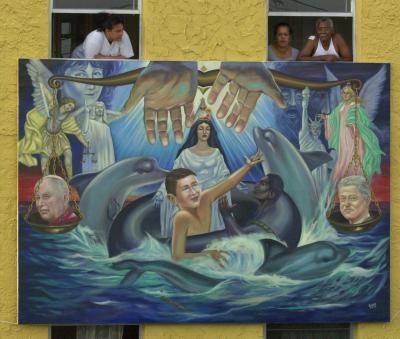As usual one of the points of contention with the immigration issue and the Cuban embargo issue is government subsidization. Many Americans object to immigration or so called "illegal immigration" because they object to the subsidization of those immigrants' budgets with the welfare handouts. With the Cuban embargo many Cuban exiles also have the same objection--they don't want Havana to have the bail out system of government subsidization from the US for failed industries or nationalized industries in Cuba; in essence they object to taxpayers (especially Cuban exile money) paying to bail out the out and give lines of credit to Fidel Castro and his henchman. Maybe if one day we could have a government that doesn't support socialism for the rich as for the poor, they would not have to worry about maintaining an embargo.
HAVANA (Reuters) - Idaho Gov. Butch Otter arrived in Cuba on Tuesday looking to get his state's farmers a share of U.S. food sales to the communist-run island.
"We are going to continue to build good relationships with the folks in Cuba," Otter said on arrival, heading a group of 35 state officials and representatives of dairy, grain and potato producers.
"They are all looking forward to the opportunity to negotiate and do business with Cuba," he said.
Otter has visited Havana three times before as a U.S. congressman, winning in 2004 a Cuban commitment to buy Idaho products. But few sales came through.
Last year, Cuba imported $340 million of U.S. farm products such as chicken, wheat, corn, rice and soybeans, making the Caribbean nation's ideological foe the biggest foreign supplier of food on Cuban plates.
As an exception to the 45-year-old U.S. trade embargo on Cuba, the U.S. Congress approved food sales on a cash-only basis in 2000. Cuba has since shot up to become the 34th largest market for U.S. agricultural exports out of 227 countries.
Cuban imports from the United States slipped slightly over the past two years, however, due to tougher payment procedures introduced by the Bush administration as Cuba enjoyed subsidies and credits from Venezuela and China.
Various bills have been introduced in the U.S. Congress this year with the support of farm state legislators to loosen restrictions on trade and travel to Cuba by Americans One proposal would allow direct banking with Cuba to pay for U.S. agricultural shipments. Experts on Cuban trade say this would greatly facilitate sales.
Another bill, prompted by Cuban oil exploration in the Gulf of Mexico, would exempt U.S. oil companies from the embargo like the food industry. The energy bill, sponsored by two senators from farm states, Idaho Republican Larry Craig and North Dakota Democrat Byron Dorgan, would allow U.S. companies to explore for oil in Cuba and sell drilling equipment there.
Cuba discovered a noncommercial reservoir of light crude in its Gulf waters three years ago and a Spanish-Indian-Norwegian venture plans to drill there again in 2008.
"This isn't mayonnaise we're talking about here, this is hundreds of millions of dollars," said Kirby Jones, president of the U.S.-Cuba Trade Association, a Washington-based group that promotes trade with Cuba.
Kirby believes the U.S. oil industry's interest in Cuba signals the end of the embargo enforced against Cuba since the Kennedy administration.
For the first time since the embargo was imposed "Cuba has something we need," he said.
"Nobody is in agreement…It’s that, no one says it and no one takes the risk to say it, to speak the truth. That’s what is happening. In other words, one of the foundations, of what are the regimes in the entire world, in all of history, has been fear and lies. In other words, once you are in fear that's when you don’t take a risk, where you collect yourself and don’t unite…understood? To be in fear is not to offer help to anyone because that signifies risk." -Gorki Águila Carrasco, lead singer, guitarist of the music group Porno Para Ricardo and political prisoner
"Socialist ideology, like so many others, has two main dangers. One stems from confused and incomplete readings of foreign texts, and the other from the arrogance and hidden rage of those who, in order to climb up in the world, pretend to be frantic defenders of the helpless so as to have shoulders on which to stand." --Jose Marti

View Che Guevara's Forgotten Victims on Scribd
SEARCH? GOOGLE IT!
Tuesday, April 17, 2007
CUBA MIGHT HAVE OIL, IT MIGHT HAVE CONSUMERS BUT IT STILL HAS WELFARE FROM THE US
Subscribe to:
Post Comments (Atom)





No comments:
Post a Comment